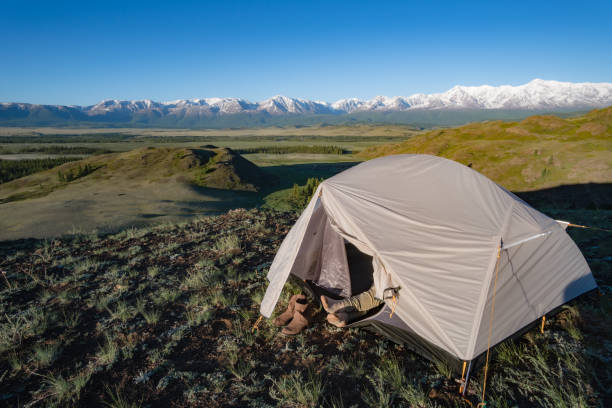Overlanding has surged in popularity across America as adventure seekers trade traditional travel for off-the-beaten-path exploration. At the heart of this exhilarating pursuit is the overlanding tent—an essential piece of gear that transforms your vehicle into a mobile base camp. Whether you’re a seasoned overlander or a newbie planning your first expedition, understanding the ins and outs of overlanding tents is crucial for a successful journey. This comprehensive guide covers everything you need to know about overlanding tents, from types and features to tips for selecting the perfect tent for your adventure.
What is Overlanding?
Overlanding is a form of self-reliant travel that involves the use of off-road vehicles to explore remote destinations where the journey itself is the primary goal. Unlike traditional camping, overlanding emphasizes the journey and the exploration of landscapes rather than just the final destination. It requires a balance of driving, camping, and often, off-road navigation skills. Overlanding tents, specifically designed to be mounted on or inside vehicles, provide a comfortable and efficient solution for overnight stays during these long treks.
Types of Overlanding Tents
Roof-Top Tents (RTTs)
Roof-top tents are perhaps the most iconic type of overlanding tents. Mounted on the roof of your vehicle, these tents offer elevated sleeping quarters, which can be beneficial in terms of safety and comfort. RTTs keep you off the ground, away from potential critters, and provide a better vantage point. They are easy to set up and often come with comfortable mattresses.
Ground Tents
Ground tents designed for overlanding are typically more robust and spacious than regular camping tents. They are intended to withstand harsh conditions and can be set up next to your vehicle. While they don’t offer the elevated sleeping arrangement of RTTs, ground tents provide ample space and are often easier to pack and store.
Truck Bed Tents
For those with pickup trucks, truck bed tents are a popular option. These tents are designed to fit in the bed of your truck, utilizing the vehicle’s flat surface for sleeping. Truck bed tents are convenient, as they maximize the use of available space and often come with features tailored for overlanding.
Hybrid Tents
Hybrid tents combine the features of RTTs and ground tents, offering versatility for overlanders who want the option to set up camp either on the roof or on the ground. These tents adapt to different terrains and conditions, making them a flexible choice for varied expeditions.
Key Features to Consider
Durability
Overlanding involves traversing challenging terrains and weather conditions. Your tent must be built to withstand these elements. Look for materials like heavy-duty canvas or ripstop nylon, reinforced seams, and robust zippers.
Ease of Setup
After a long day of driving, the last thing you want is a complicated tent setup. Opt for a tent that can be easily and quickly pitched. Many RTTs and truck bed tents are designed for swift deployment, often with a simple unfolding mechanism.
Comfort and Space
Comfort is paramount when spending extended periods on the road. Consider the size of the tent and the sleeping arrangements it offers. Features like built-in mattresses, ample headroom, and ventilation can significantly enhance your camping experience.
Weather Resistance
Your tent should provide shelter from the elements, be it rain, wind, or extreme temperatures. Ensure the tent has adequate waterproofing, strong wind resistance, and ventilation options to manage condensation.
Weight and Storage
Overlanding requires efficient use of space and weight distribution in your vehicle. Choose a tent that balances durability with lightweight design. Additionally, consider how the tent packs down for storage and whether it fits well with your vehicle’s cargo capacity.
Tips for Choosing the Perfect Overlanding Tent
Assess Your Vehicle
Different tents are compatible with different vehicles. Ensure your chosen tent fits your vehicle’s roof rack or bed dimensions and can be securely mounted. Check the weight capacity of your vehicle’s roof or bed to avoid overloading.
Plan for the Terrain
Consider the types of terrain and weather conditions you will encounter. For rugged off-road adventures, a durable RTT might be ideal, while a ground tent could suffice for less challenging environments.
Budget Wisely
Overlanding tents come in a wide range of prices. Set a budget that considers not only the initial cost of the tent but also additional expenses such as mounting systems and accessories.
Test Before You Trek
Before embarking on a long journey, set up your tent at home or on a short trip to familiarize yourself with its setup and features. This practice run can help identify any issues and ensure you’re prepared for your adventure.
Connect with Fellow Overlanders for Tips
Engaging with the overlanding community can provide valuable insights. Join online forums, social media groups, or local clubs to connect with fellow overlanders for tips on the best tents, setup tricks, and maintenance advice. Their firsthand experiences can guide you in making an informed choice.
Maintenance and Care
To extend the life of your overlanding tent, regular maintenance is essential. Clean the tent after each use, ensuring it is dry before storage to prevent mold and mildew. Check for any damage and repair it promptly. Store the tent in a cool, dry place away from direct sunlight to avoid material degradation.
Embrace the Overlanding Lifestyle
An overlanding tent is more than just a piece of equipment; it’s a gateway to the thrill of exploration and the freedom of the open road. By choosing the right tent and preparing adequately, you can immerse yourself in the overlanding lifestyle, discovering breathtaking landscapes and creating unforgettable memories. Embrace the journey, connect with fellow adventurers, and let the spirit of overlanding guide your travels across America.
To safeguard your belongings at home while enjoying your overlanding adventure, consider storing your valuables such as jewelry, large equipment, or important documents in storage units like the storage units Orangeville. These units offer temporary storage solutions for your safety at affordable prices.
Read More:

